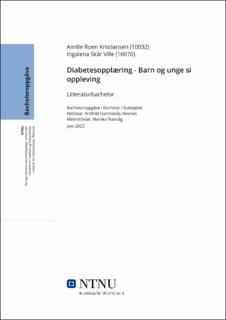| dc.contributor.advisor | Vestnes, Arnhild Hammerås | |
| dc.contributor.advisor | Tranvåg, Monika | |
| dc.contributor.author | Kristiansen, Amilie Roen | |
| dc.contributor.author | Ville, Ingalena Skår | |
| dc.date.accessioned | 2023-07-15T17:23:04Z | |
| dc.date.available | 2023-07-15T17:23:04Z | |
| dc.date.issued | 2023 | |
| dc.identifier | no.ntnu:inspera:146721079:151819856 | |
| dc.identifier.uri | https://hdl.handle.net/11250/3079502 | |
| dc.description.abstract | Bakgrunn: Det å få diabetes som barn og ungdom er utfordrande. Barn opplev store livsendringar og usikkerheit rundt diabetes, og korleis denne påverkar kvardagslivet. Opplæring er sentralt for at barnet skal føle seg førebudd for å handtere sjukdommen på eiga hand.
Hensikt: Få innsikt i viktige faktorar under opplæring for barn og unge med diabetes type 1.
Metode: Ein systematisk litteraturstudie som nyttar seg av sju forskingsartiklar. Alle artiklane er av kvalitativ metode.
Resultat: Analyseringa av artiklane resulterte i tre hovudtema som var bruken av leik, inkludering og myndiggjering. Dette var viktige faktorar under opplæring for barn og unge med diabetes type 1.
Konklusjon: Å tilpasse opplæringa til kvart enkelt barn er viktig. Det er fleire faktorar som påverkar barnet si oppfatning av informasjonen som vart gitt. Leiken ga barna motivasjon til å lære og dei opplevde større kontroll når dei vart involvert i opplæringa. Myndiggjeringa gjorde dei betre rysta til å meistre behandlinga og handtere sin diabetes. | |
| dc.description.abstract | Background: Getting diabetes as a child and adolescents is challenging. Children experience major life changes and uncertainty around diabetes, and how it affects everyday life. Education is central for the child to feel empowered to deal with the disease on their own.
Aim: Gain insight into important factors during education for children and adolescents with type 1 diabetes.
Method: A systematic literature study that makes use of seven research articles. All the articles are of a qualitative method.
Result: The analysis of the articles resulted in three main themes which were the use of play, inclusion and empowerment. These were important factors during education for children and adolescents with type 1 diabetes.
Conclusion: Adapting the education to each individual child is important. There are several factors that influence the child's perceptions of the information that was given. The use of play gave the children motivation to learn, and they experienced greater control when they were involved in education. The empowerment process made the children able to master the treatment and manage their diabetes. | |
| dc.language | nno | |
| dc.publisher | NTNU | |
| dc.title | Diabetesopplæring - Barn og unge si oppleving | |
| dc.type | Bachelor thesis | |
